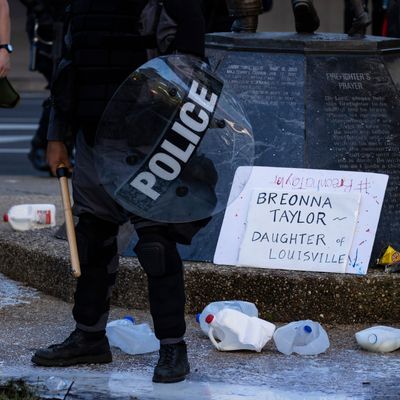
Two and a half months before Minneapolis police killed George Floyd in broad daylight, Louisville police killed Breonna Taylor in the middle of the night. Unlike Floyd’s case, which ignited immediate protests in the Twin Cities and across the country, it took months for people to take to the streets on behalf of the 26-year-old ER technician and former EMT who was shot dead in her own home. By this weekend, that had changed.
Sunday afternoon, after three consecutive nights of tense protests in downtown Louisville, hundreds of demonstrators — some holding signs, nearly all wearing face masks — gathered outside of the University of Louisville basketball arena on Main Street and yelled Taylor’s name. The “Healing Ceremony,” organized by Black Lives Matter Louisville, began with a breathing exercise, singing, and a prayer. White attendees were asked to turn to black ones and apologize for slavery, for Jim Crow, for mass incarceration, and for the killings of Floyd, Taylor, and Ahmaud Arbery.
“I’m sorry for Breonna,” Jecorey Arthur, a local activist and educator, told the rallygoers, some of them wiping their tears. “You gotta say that one as loud as you can. She came from right here in this city. I’m sorry for Breonna! I’m sorry for Breonna!”
Arthur, like many protesters in Louisville, called for the firing and arrest of the police officers involved in Taylor’s shooting. On March 13, three members of the Louisville Metro Police Department burst into the 26-year-old’s apartment at 12:40 a.m. as a part of a drug investigation. Taylor’s boyfriend, Kenneth Walker, believed someone was breaking in and fired his legal firearm one time. Police returned fire, and Taylor was shot eight times. She died on her hallway floor.
While none of the officers involved in Taylor’s killing have been arrested, Walker was. He was charged with attempted murder. Last Tuesday, more than ten weeks after Taylor was shot and after the case began to receive national attention, the charges were dropped. Officers Jonathan Mattingly, Brett Hankison, and Myles Cosgrove, meanwhile, remain on administrative leave pending the results of an investigation.
“There is no reason why those officers should still be employed,” said State Representative and U.S. Senate candidate Charles Booker, who was tear-gassed at protests Saturday and spoke at Sunday’s rally. “I know an investigation is happening, but we can see what’s right before our faces, that law enforcement kicked in their door, no one knew who was coming in, it was in the dead of night, they killed a woman that was doing everything right, and her partner that was defending her was arrested and charged with attempted murder.”
So far, the city has responded with a series of corrective measures. Mayor Greg Fischer suspended the use of “no-knock” warrants, which officers had on the night Taylor was killed, though they say they announced themselves anyway. The use of body cams is also being expanded to include plainclothes officers like the ones who kicked down Taylor’s door. A civilian review board will also be put together to provide oversight for the police department.
The delay in firing the officers who broke down Taylor’s door and ended her life stands in contrast to the aftermath of George Floyd’s killing last week. Within days, the four Minneapolis officers involved were fired, and Derek Chauvin, who held his knee on the 46-year-old’s neck for eight minutes, was arrested.
“There’s no reason why someone should break into your home unannounced and come in and shoot you and kill you,” says Ashley, a 30-year-old Louisville native who declined to give her last name. She held a sign at Sunday’s rally that read “The world needs good cops, not good old boys.” Her negative experience with the police department in this highly segregated city goes back to her teenage years.
“LMPD has always been aggressive,” she said. “I remember being 17 and me and my friends were sitting out on the porch and the police officer telling my friend, ‘I shoot little black boys in the back like you all the time.’”
Now, she said, her son is 15, and she worries about getting a phone call like the one Taylor’s mother got in March: “We can’t walk down the street. We can’t sleep. We can’t go to the store to buy Skittles and juice. We can’t do nothing without the police killing us. And then it’s like, oh well, nothing happens. No more.”
The LMPD’s image has not benefited during the weekend’s protests. One law enforcement officer was caught on camera Friday night shooting rubber bullets at a reporter. On Saturday, police ransacked a supply of milk and water protesters had set aside because they were deemed “hazardous.” And Sunday, officers fired tear gas at peaceful protestors 40 minutes before the city’s curfew went into effect. When asked why, one local lawmaker explained that “police saw people approaching that had leaf blowers loaded with bleach.”
It’s little wonder that John Randolph is feeling cynical. A local minister who gave a prayer at the start of Sunday’s rally and wore a shirt with the phrase “I can’t breathe,” Randolph said the weekend’s protests were the result of people who are frustrated and at their “wits’ end.”
“We have been fighting this fight for a very long time,” he said. “There are countless names even just in this city that have died in police custody, that have died at the hands of police and nobody has gone to jail. The cynical side of me says that this is just another iteration of what’s been going on in the past. But I’m a faith leader, so I have hope.”





























